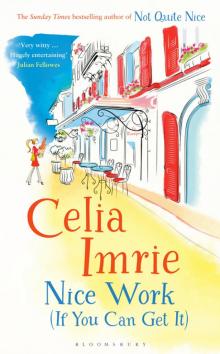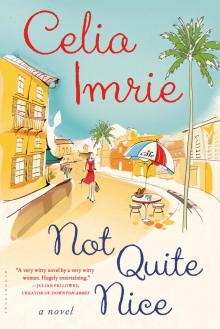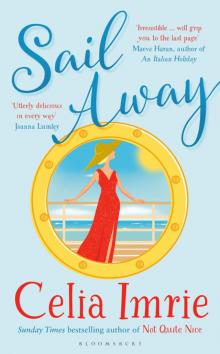- Home
- Celia Imrie
A Nice Cup of Tea
A Nice Cup of Tea Read online
A NICE CUP OF TEA
To all my brave friends in Nice
ALSO BY CELIA IMRIE
The Happy Hoofer
Not Quite Nice
Nice Work (If You Can Get It)
Sail Away
CONTENTS
Also by Celia Imrie
Part One
One
Two
Three
Four
Part Two
Five
Six
Seven
Eight
Nine
Part Three
Ten
Eleven
Twelve
Thirteen
Fourteen
Fifteen
Part Four
Sixteen
Seventeen
Eighteen
Nineteen
Twenty
Part Five
Twenty-one
Twenty-two
Twenty-three
Twenty-four
Twenty-five
Twenty-six
Part Six
Twenty-seven
Postscript
Acknowledgements
Also available by Celia Imrie
PART ONE
PAIN PERDUE
Literally, Lost Bread – in the UK known as French Toast. Serves 8.
3 eggs
200ml milk
1 teaspoon orange-flower water
20g golden caster sugar
ground nutmeg, to taste
80g unsalted butter
8 slices bread or brioche
icing sugar, sieved
In a large bowl or a concave plate, beat the eggs, then add the milk, orange-flower water, sugar and nutmeg. Mix well.
Melt the butter in a frying pan, taking care not to let it burn. Dip the slices of bread into the mixture until they are well covered, then drop them into the melted butter. Fry until golden, turning at least once.
Serve after sprinkling with sieved icing sugar. Add fruit, lemon juice or jam to suit your taste.
ONE
Bellevue-sur-Mer. The name translates as ‘beautiful view on sea’. Looking out from Bellevue-sur-Mer certainly gave a beautiful view of the sea, along with the hazy headlands of the Côte d’Azur. The beautiful coast and its sheltered harbour had made Bellevue. At first, just a few fishermen’s cottages were built on the shore; then, during the nineteenth century, Bellevue grew into a small village with its own shops and church. Slowly the village spread out from the waterfront and up the hill until it became the town it was today.
Tucked neatly into a corner of a horseshoe-shaped cove, the old harbour was now a busy port de plaisance, a public marina, crammed with rows of brightly painted fishing boats, which bobbed in rhythm on the turquoise waters alongside the great white motor yachts of the rich. Luckily – or perhaps not – for the town, the waters were not deep enough for cruise ships, or the boats of the mega-rich which used a town a few miles along the coast. But for the medium-rich, the retirees and the businessmen out to impress, Bellevue-sur-Mer marina was a popular port of call, where they could moor their boats, restock and recharge their electricity while taking lunch.
If you were lucky enough to own one of those floating gin palaces, you might sail out into the bay and, once you hit the horizon, turn and glance inland. It was worth doing, for, from out at sea, the sight of Bellevue was as pretty as a picture-postcard village, with its pastel-painted cottages rising sharply up the hillside, the twisting lanes and roads zigzagging up to the brow of the green hill, behind which loomed the grey craggy foothills of the Alpes-Maritimes. If you visited during the winter months, from December to May, you might see the snowy caps of the ski-stations, a few miles inland.
Along the shoreline of the town there were cafés and little shops selling the usual tourist tat – everything from tea towels and lavender bags to calendars and tin trays. There was even a casino.
Near the Gare Maritime stood a small house, divided into two apartments – the kind of building which in England would be called a maisonette.
In the lower apartment lived Theresa Simmonds.
When the bottom fell out of her life, Theresa had left her home in London and moved here permanently. She had been coming up to the age of sixty when she lost her job; she had no pension yet and was left with no income and nothing to do. So, on a whim, she had sold up and moved to Bellevue-sur-Mer.
For the last three years Theresa had been part of a tightly knit gang of expats, who had been running La Mosaïque, a small restaurant on the seafront, a few doors down from her flat.
Theresa cooked. Her friends William, Benjamin and Carol managed the front of house, taking the positions of welcome desk and bookings, maître d’, hostess, sommelier and waiting tables between them. They also did the lion’s share of the boring stuff: checking that their licences and insurance were up to date and filling in the annual tax returns. Ex-actress Sally Connor, formerly Doyle, helped out all round, in particular doing the publicity and driving the van to pick up supplies, like the daily fresh fish from a stall on the shore in nearby Cagnes-sur-Mer. Zoe, very much older than the others (though, if you had been rude enough to ask her, she would deny it), had invested her money in the restaurant, and between trips to spas in Switzerland, from whence she returned home with puffed lips and a dubiously smooth forehead, she brought many of her well-heeled friends to La Mosaïque to eat and spend, spend, spend.
Theresa, at a mere three years’ residency, was the newcomer among the gang. And, as her French was still not good enough, she was unable therefore to do anything demanding public-relations skills, unless it was in English. But, anyway, she was happiest behind the scenes in the kitchen.
The purchase of the restaurant had come with the unexpected benefit of a unique mosaic medallion which had been cemented into the pretty floor by the previous owner. The mosaic turned out to be a self-contained, signed work by Pablo Picasso.
Today was an exciting day for Theresa and all the other owners of La Mosaïque, for the mosaic medallion, valued by experts for at least one million euros, was about to go under the hammer at Sotheby’s in Paris.
The gang had had to wait a long time for this. The artwork was taken to the French capital, where it was checked out and researched. After several months it was proved to be a genuine creation of the famed master of twentieth-century art.
Once estimates and reserves, along with very costly insurance and storage costs, had been put on the medallion, it was photographed and advertised all over the world, and, after what felt like a very long time indeed to the owners of La Mosaïque, it was finally put into the annual Sale of Important Modern Art.
Today was the day when all would be decided and they would know how rich they had become.
Theresa was totally on edge. William and Benjamin had pulled the straws to be the two who went up to Paris to attend the sale, while the others sat round the table in Theresa’s apartment, waiting for the phone to ring with news. When the draw happened Theresa felt relieved to be staying at home, but now that the sale was imminent she wished she was in the saleroom as the anticipation was starting to make her feel queasy.
She had made sandwiches and tea, but felt unable even to look at them. Carol and Zoe hunched over the table. The phone sat in the centre, pride of place, like a Sunday roast.
Sally was with Theresa, wiping down the tops and packing the dishwasher, fussing around her while she laid a tray with plates, cups and cutlery.
‘I just need to keep busy,’ Sally said as she sprayed a whiff of surface cleaner over the fridge door and dabbed at an imaginary smear.
‘It’s like waiting for a prison verdict,’ said Zoe.
‘I’d prefer to think it’s more like knowing
whether or not we have the X-factor,’ drawled Carol, a beautiful American from Muncie, Indiana, who had in fact, before undergoing surgery to become herself, been christened and brought up as Mark. ‘Even if we get the lowest estimate, I feel I have to say that. Only half a million? Gee, I’d be happy as a clam being forced to share that half a million between the six of us. But if we hit the bingo, and we bag several millions each, well . . .’
‘Dream on, dear,’ Zoe interrupted Carol’s reverie. ‘If we get the lower estimate, you’ll only be sharing what remains of the half million after you’ve paid me back, paid off all our creditors and got La Mosaïque back on its feet. And as the debts are mounting daily, frankly, dear, what remains to be shared from five hundred grand would be mere pin money.’
‘If there’s anything left at all,’ added Sally, puffing the spray at a nearby light-switch and polishing it. ‘We have to strike it big or we are doomed.’
The problem was that, for the last three years, the owners of La Mosaïque had steered their way through extremely rough waters. And their difficulties had not been brought on by their own lack of industry or imagination. Twice, since the joyous opening, the restaurant had come really close to bankruptcy.
It was only a few months after they opened that the result of the Brexit vote had shaken them all, leaving them worried that, depending on how the whole catastrophe was managed, they might be left high and dry, unable to continue working or even living here in France. The worst scenario that they could imagine had them all being forced to give up everything they had worked so hard for here, and obliged to return to a country which, for the majority of them, had not been home for a very long time. Theresa felt she had only just upped sticks to settle here, and the thought of doing it all in reverse was too horrible, particularly as she would then consider it all to have been a failure. It would certainly look that way, she knew, to her not-so-close friends in London. Not only did the referendum result leave the gang of six owners of La Mosaïque in limbo, but it impacted the profits of the business too. The other local expats, who made up a fair percentage of their regular clientele, started pulling in their horns, preparing for the worst. It was obvious why they did this. The first thing that people who feared for their future cut back on was inevitably the unnecessary expense of dining out. Tourism from Great Britain also diminished during this time.
They were quite unprepared for the second enormous blow – a tragedy which occurred only three weeks after the Brexit vote.
The nearby city of Nice was hit by a devastating terrorist attack.
On 14th July 2016, right after the annual firework display, held to celebrate the Fête Nationale, a machine-gun-wielding terrorist had ploughed through the crowd in a heavy lorry, killing eighty-six people and hospitalising almost five hundred more.
That night the restaurant had been closed for the holiday.
Theresa and Sally had gone into Nice together to have some fun. When the lorry struck they were caught up in that terrified crowd. As they ran for their lives, Theresa injured herself trying to leap over a set of overturned bins in a side street. She was left for six months with a bad limp, and had been unable to stand for long periods, which made cooking difficult.
Although Sally stood in, she herself was in no state to work, and as a result the restaurant had no choice but to take on a temporary chef.
Though not physically injured, Sally was badly shaken. For two months she was unable to drive, as whenever a lorry came towards her she went into the shakes and had to pull in to get herself back together again.
Carol took on her duties as van driver.
Even now, almost three years later, whenever either Theresa or Sally heard a police or ambulance siren, they still broke into a sweat and their hearts battered in their chests. Post-traumatic shock took some getting over.
Carol and William were particularly assiduous in their care of Sally and Theresa, but no one quite foresaw the next direct result of the dreadful attack.
Many foreign tourists, mainly the English and the Americans, cancelled their holidays on the Côte d’Azur, while local people simply stopped going out after dark. Even during the day the streets were markedly quieter. For the first week the city was eerily silent and still, and for months afterwards it was a ghost of its former self.
As if the attack itself were not bad enough, the city of Nice and all its satellite towns and villages suffered an enormous financial downturn. By the end of the year 30 per cent of bars and restaurants in the area had closed, including establishments which had been successful and well known for decades. Some of the busiest streets, like the famed Marché aux Fleurs in Nice, were suddenly lined with boarded-up buildings which, before the attack, hosted thriving brasseries, cafés, burger bars and restaurants.
It was a miracle that, principally thanks to Zoe’s continued financial support, La Mosaïque had survived at all.
But for the owners of the restaurant, their joint faith in the future had been secured by the knowledge that they owned this Picasso mosaic, and that it was proceeding through the stages towards a sale at the auction house. Hopefully the mosaic would achieve a great price, with which they would pay off their debts and then divide the profit.
‘We’re lucky,’ said Zoe. ‘The economic downturn means that more and more people are turning to tangible things like Bitcoin and art.’
‘But I thought Bitcoin was only virtual,’ replied Sally.
‘Who cares?’ Zoe knocked back her cup of tea as though it was a shot of eau de vie. ‘Truthfully I’d think we’re likely to reach about six mill.’
‘A mill each,’ crooned Carol, munching on a langue de chat.
‘La la la la la!’ Theresa put her fingers in her ears. ‘Please, Zoe, let’s not tempt fate.’
‘Theresa’s right,’ said Sally, moving over with the second tray, and taking a seat round the table. ‘It’s not as though this will be pin money for us. After the events of the last couple of years, well . . . If we don’t get good money, we’re all done for.’
Theresa laid the platter of sandwiches next to the teapot. She still couldn’t face eating, she felt so tense. ‘Not totally done for, Sally; we’re still scratching along. It’s not over . . . yet.’
‘For one awful moment,’ Zoe put her hand to her wrinkled chest, ‘I thought you were going to say, “It’s not over till the fat lady sings,” and then . . . God forbid, you were going to sing to us.’
Theresa did not like the implication that Zoe thought she was fat, even though, as she smoothed her hands down her sides, she could feel definite rolls of flab around her waist. She preferred to think of herself as slightly embonpoint.
‘I still don’t understand what we’re doing huddled around this phone?’ asked Carol. ‘Wouldn’t it be easier to link up on the net? Then we could see it live and not be dependent on those two keeping us informed.’
‘No unofficial filming allowed.’ Sally grabbed a tomato sandwich and took a bite. ‘I imagine no one wants to have their buying splurges recorded and put on Facebook for their husbands or wives to see.’ She took a second bite just as, with a loud shrill tone, the phone rang.
Everyone leaned away from the table.
‘Well, go on.’ Zoe jerked forward. ‘Somebody answer it.’
Theresa put down the teapot and picked up. ‘Hello?’
All four faces strained to listen to the voice in the phone applied to Theresa’s ear.
‘Oui, Cyril. Évidemment.’
Everyone slouched back to their original positions.
‘Actuellement, il reste le même que d’habitude. Oui. Je t’aime. À demain.’ She put the phone down. ‘That was Cyril. About the meat delivery. Did we like the new sausage? Do we want to increase it up to the old level yet.’
All four women let out a sigh and reached out for the sandwiches.
‘“Je l’aime”, Theresa.’ Sally corrected her French. ‘“Aimez-vous la nouvelle saucisse?” Correct response – “Oui, je l’aime.” Not “Oui,
je t’aime.” Unless you want Cyril to think you love him.’
‘Je l’aime,’ repeated Theresa. ‘I always get that one wrong. Je l’aime.’
‘Moi non plus,’ added Zoe, making a reference to the 1960s racy song ‘Je t’aime . . . mois non plus’. ‘But to be fair, I do adore his sausage.’ Zoe laughed alone at her own joke.
‘How can Cyril be so stupid? He knows why we’re cutting back – like everyone else around here.’ Sally swallowed the last of her sandwich. ‘And, anyway, he could have asked me yesterday. I was chatting to him at the market. He was asking whether we’d all move away from Bellevue-sur-Mer once we were rich! Marcel seemed very worried by the idea.’
‘Why would Marcel care?’ asked Zoe. ‘He owns the brasserie next door. I’d think he’d be whooping it up at the idea of us all buggering off. His business would double without us.’
‘This is nerve-racking.’ Theresa fiddled with the teapot. ‘Why don’t they just get on with it?’
‘Perhaps lots 1 to 254 are taking longer than expected,’ said Carol. ‘The timings they give are mere approximations, you know.’
‘Like the estimates they give us on the works of art, you mean?’ said Sally, reaching for a second sandwich.
Carol held up her large hands. ‘I don’t know why we’re all being like this. After all, whatever we get is a win. No?’
‘If we get the lower estimate, it’s only a mini-win,’ said Sally.
‘Stop moaning. It would still get us out of hot water.’
The phone rang again. This time Theresa didn’t wait, and snatched the receiver. ‘Allô? . . . William! Any news?’
‘Put it on speakerphone,’ said Zoe. ‘Let us all hear.’
Sally fiddled with the phone base and eventually got the speakerphone turned on.
‘There’s an internet bid of two million,’ said William. ‘They’re starting at two million.’
Carol crossed herself and rolled her eyes up to look at the ceiling.
They all leaned in towards the phone, straining to hear the auctioneer as he called out the bids.

 A Nice Cup of Tea
A Nice Cup of Tea Nice Work (If You Can Get It)
Nice Work (If You Can Get It) Not Quite Nice
Not Quite Nice Sail Away
Sail Away